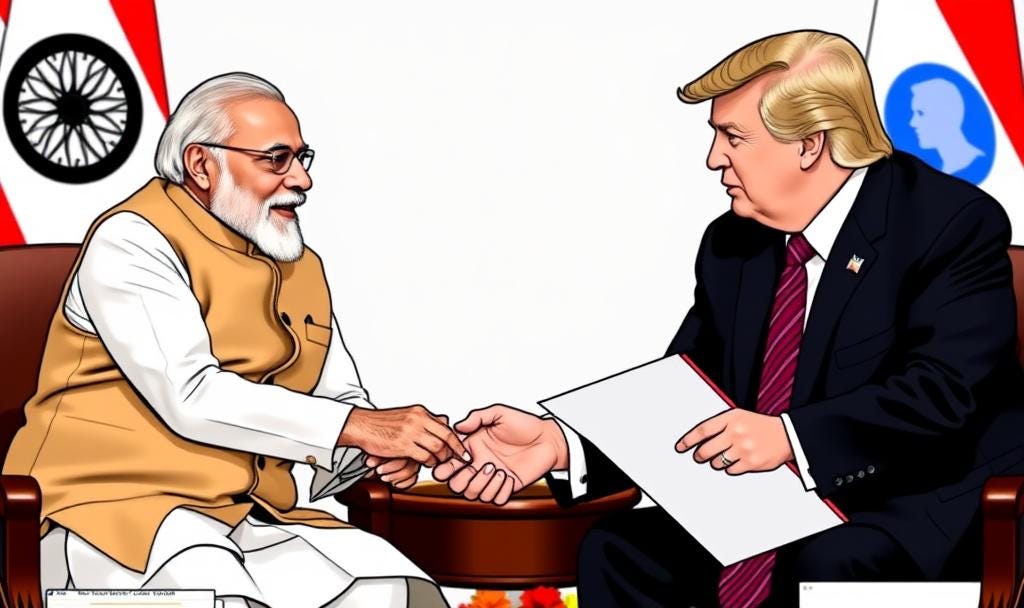Modi-Trump Talks Yield Key Agreements: Trade, Defense, and Beyond
In a significant diplomatic engagement, Indian Prime Minister Narendra Modi met with U.S. President Donald Trump at the White House, marking a pivotal moment in U.S.-India relations. During Trump's second term, the meeting focused on key areas such as trade, defense cooperation, and energy security. Both leaders emphasized their commitment to strengthening bilateral ties, with discussions centered on easing trade tensions and enhancing defense partnerships. The visit came as Trump announced plans for reciprocal tariffs, which could impact India's trade surplus with the U.S. Despite these challenges, Modi and Trump agreed to negotiate a trade deal and finalize a new defense framework, aiming to more than double bilateral trade to $500 billion by 2030.
Trade and Tariffs: A Delicate Balance
Trade and tariffs were central to the discussions between Modi and Trump. The U.S. has been pressuring India to reduce its high import duties, which Trump has labeled "extremely unfair.”
In response, India recently lowered its average tariffs from 13% to 11% to pre-empt Trump's tariff moves.
However, experts remain divided on whether India has successfully dodged potential tariff shocks. Ajay Srivastava, founder of the Global Trade Research Institute, believes that most U.S. exports to India face import taxes of less than 5%, minimizing the impact of reciprocal tariffs. Conversely, Abhijit Das, former head of the Centre for WTO Studies, warns that the U.S. might consider non-tariff barriers and value-added taxes in its tariff strategy, posing challenges for India's domestic producers.
"The devil lies in the details. Reciprocal tariffs won't just mirror India's import taxes—other factors will come into play," Das noted.
Defense Cooperation: A Growing Partnership
Defense cooperation was another key area of discussion. Trump announced plans to significantly increase U.S. military sales to India, including the potential sale of F-35 jets, marking a significant expansion of their defense partnership7. This move reflects India's shift towards the U.S. as an important arms supplier, with U.S. sales surging from near zero to $20 billion over recent years7. However, experts caution that bureaucratic hurdles and export controls could complicate the transfer of sensitive technologies like the F-35.
"This sounds good, but it may be a case of putting the cart before the horse," said Michael Kugelman of the Wilson Center's South Asia Institute7.
Energy and Trade Goals: Ambitious Targets
Modi and Trump set ambitious targets for bilateral trade, aiming to reach $500 billion by 2030, more than doubling the current figure. This goal is supported by increased U.S. oil and gas exports to India, which Trump hopes will make the U.S. India's leading energy supplier6. The trade agreement negotiations will focus on market access, tariff reductions, and supply chain integration across goods and services.
"The announcement that the two sides will pursue a trade deal gives India an opportunity to negotiate for reduced tariffs on both sides," Kugelman observed7.
Countering Terrorism and Security Challenges
The meeting also addressed security concerns, including the extradition of Tahawwur Rana, a suspect in the 2008 Mumbai terror attacks. Trump confirmed the U.S. had approved Rana's extradition, a move welcomed by Modi as a significant step in the fight against terrorism6. Both leaders emphasized their commitment to countering terrorism and enhancing global security cooperation.
"India and the U.S. will stand united in the fight against terrorism," Modi stated during the meeting6.
Modi Meets Musk: Exploring Tech Opportunities
In addition to his talks with Trump, Modi met with Tesla CEO Elon Musk to discuss emerging technologies and potential investments in India. While Musk's plans for Tesla and Starlink in India remain uncertain, the meeting highlighted India's interest in attracting foreign tech investments7.
Future Outlook
In conclusion, the Modi-Trump meeting underscored the growing importance of U.S.-India relations, with significant trade, defense, and energy cooperation agreements. Despite the challenges, both nations are poised to deepen their partnership, potentially reshaping the global economic and security landscape. As bilateral trade and defense ties continue to evolve, the success of these initiatives will depend on navigating complex trade and security dynamics.



